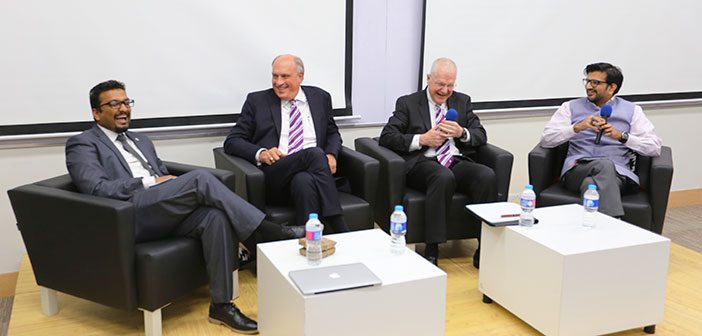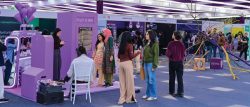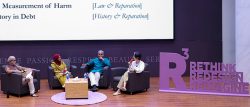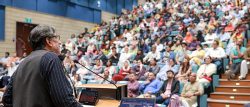HABIB UNIVERSITY: Quality education in accordance with global trends and market requirements is essentially important for individuals to excel and prosper in various spheres of academic and social life. A high quality education is more than just a study curriculum – it does not only revolve around the dissemination of required knowledge but it is more about being designed in such a way that students are enabled to think, analyze, and knowledgeably reflect upon their learning while devising solutions in their daily lives.
The liberal arts and sciences model of education being offered at Habib University is one such example of a truly higher education where students gain an intellectual understanding of the various aspects of the modern world. In order to understand the role and importance of liberal arts education in today’s globalized world, a panel discussion with HU Board Members Dr. Charles Thorpe and Dr. Mark Weichold, was recently hosted at the Tariq Rafi Lecture Theater on campus, for students, faculty and staff.
Moderated by Dr. Anzar Khaliq, Program Director of Integrated Sciences and Mathematics (iSciM), and Dr. Fahd Ali, Program Director of Social Development & Policy (SDP), the discussion started off with the definition and interpretation of Liberal Education. HU Board Member and panelist, Dr. Charles Thorpe, who is currently serving as the Senior Vice President and Provost at Clarkson University, New York, defined ‘Liberal Education’ as a mode of study that produces free citizens of the world.
LIVE on #Periscope: Session with Habib University’s #Board members on #liberalarts – #happeningnow #HULIVE https://t.co/MgrOyPvrHs
— Habib University (@HabibUniversity) December 2, 2016
Liberal education comes from the Latin word ‘liber’ meaning free. This is going to make you free men and free women; free of prejudice, free of preconceptions, free to reason, free to work, free to be the citizens of the world, and free to earn your own living.
LIVE on #Periscope: You are not, insects you are lions – #liberalarts education https://t.co/aAYV1015BX
— Habib University (@HabibUniversity) December 2, 2016
Dr. Thorpe was later joined by another HU Board Member, Dr. Mark Weichold, who is currently working as Professor and Executive Director of the Halliburton Global Engineering Program at Texas A&M University.
The courses that I took outside my engineering curriculum taught me how to think, how to analyze, how to express yourself, and how to do things differently that sets you apart from your peers.
LIVE on #Periscope: Exploring #liberalarts – #HUFaculty moderate a session with members of our Board, Dr. Weichold … https://t.co/yEaqaPhXIf
— Habib University (@HabibUniversity) December 2, 2016
The esteemed panelists shared their productive experiences and also discussed the applicability of the multidisciplinary model of liberal arts education in today’s world. They were of the view that a liberal arts education complements and enhances technical training and applied knowledge and lets you study courses that you might not have learnt while acquiring a career degree.
Recalling one of the undergrad experiences in liberal arts, Dr. Thorpe said, “When I go back and think about my undergrad experience, I think about courses like history. It’s much easier to be a roboticist and read history for fun or do music for fun.”
The panelists strongly believed that a liberal arts education offers a broad and diversified background and foundation, which only becomes increasingly important as one advances in his/her career.
LIVE on #Periscope: #happeningnow #hulive – final question on the final ingredients students need to pick up from t… https://t.co/Kl41HonOts
— Habib University (@HabibUniversity) December 2, 2016
The discourse was followed by an interesting Q/A session that further emphasized upon the necessity of acquiring liberal education for collaborative problem solving.
The event concluded with the distribution of tokens of appreciation to the reverend guests by Mr. Rafiq M. Habib, Chancellor of Habib University and Mr. Wasif Rizvi, President at Habib University.




